
Brake Repair
Call us at: (403) 547-5900 to schedule your appointment.
Audi Brake Repair in Calgary, AB
Whether navigating downtown traffic or exploring Alberta's mountain highways, responsive brakes are essential to safe, confident driving. At Audi Royal Oak, our technicians are trained to diagnose and repair all components of your Audi's advanced braking system, from pads and rotors to brake fluid and calipers. Squeaking sounds, increased stopping distance, a vibrating pedal, or a dashboard warning light can all be early brake wear indicators. Waiting too long for service may result in more costly repairs or compromised safety. We use only Audi-approved parts and advanced diagnostic tools to ensure a precise repair every time. Keeping your brakes in top condition is more than comfort-it's about protecting your vehicle and everyone in it.
Advanced Braking Technology Demands Expert Care
The braking system in a modern Audi is a sophisticated combination of mechanical and electronic components. Brake pads, rotors, sensors, and fluid work together with systems like Electronic Stability Control and quattro all-wheel drive to deliver exceptional stopping power. In hybrid models, regenerative braking adds another complexity layer requiring specialized knowledge. Brake fluid can absorb moisture over time, reducing its effectiveness, while worn pads can cause metal-on-metal contact, damaging rotors and reducing stopping power. Regular inspections allow us to detect these issues early, often before you feel a noticeable difference in performance. At Audi Royal Oak, we check wear levels, fluid condition, and rotor thickness as part of every brake service to help prevent bigger problems down the road.
Recognizing When Brake Service Is Needed
You don't need to wait for a dashboard alert to get your brakes checked. If you hear a high-pitched squeal, feel vibration in the brake pedal, or notice your car pulling to one side, it's time to book a service. Most brake pads last between 40,000 and 70,000 kilometers, depending on your driving style and environment. City drivers who frequently stop and start may need brake service more often. It's especially important to follow the maintenance schedule for performance-focused vehicles or hybrid SUVs. If you're unsure when your brakes were last serviced, our team can inspect them during your next visit and let you know what needs attention, keeping your Audi safe and responsive at every stop.
Audi Service Department in Calgary, AB
At Audi Royal Oak in Calgary, Alberta, our mission is to provide you with the same exceptional level of service that led you to purchase an Audi vehicle in the first place. Our Audi Technicians only use Genuine Audi Parts and specified Audi fluids when performing maintenance in our state-of-the-art Audi service department. While our skilled technicians care for your vehicle, enjoy the fantastic amenities in our comfortable and modern customer waiting area. Schedule your next Audi service appointment online, or call our service department at (403) 547-5900.

